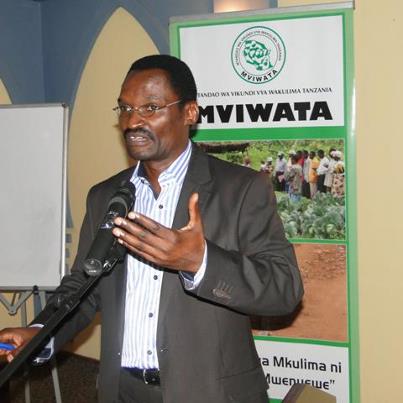As we build businesses, organize ourselves, and feed the country, we can look to other farmers around the world for inspiration and models of success. Here is one such story.

The United Republic of Tanzania, located in East Africa, is best known for hosting Africa’s largest mountain, Kilimanjaro, and for its rich coffee trade, but few realize that it also boasts a total farmable landmass greater than that of the whole of Western Europe.
Despite its assets, Tanzania faces serious issues. Ranked 152/187 on the Human Development Index, Tanzania suffers from a wide range of problems, from under-utilization of its agricultural resources to HIV/AIDS epidemics. Although 80% of the country’s exports are agricultural and the agricultural industry employs 80% of the workforce, Tanzanian farmers are impeded by lack of information, resources, and training.
“The defender of the farmer is the farmer”
-MVIWATA business slogan |
In response to these issues, twenty-two bold and inspired farmers from several regions throughout Tanzania founded Mtandao wa Vikundi vya Wakulima Tanzania (MVIWATA): the Network of Farmers’ Groups in Tanzania. Associated with the Sokoine University of Agriculture (SUA) in Morogoro, MVIWATA was registered officially in 1995. Similar to the NYFC, MVIWATA focuses on empowering local farmers by providing them with much needed resources, access to programs, and comprehensive training. Specifically, MVIWATA has organized expansive exchange programs, both domestic and international, workshops on a number of problems from fertilization techniques to AIDS prevention, and leadership training programs.

However, MVIWATA faces an onerous set of issues. Including the aforementioned resource and information problems, Tanzanian farmers are grossly underfunded. Despite the incredible reliance of the economy on agriculture, only 6.9% of the national budget goes support the industry. Given that 80% of the population not only works in agriculture but also grows their own crops, MVIWATA’s vision is that developing and reforming the agricultural infrastructure in Tanzania would contribute to overall national prosperity, local business success, and the strengthening of local villages’ economic sustainability.
In order to combat these issues and achieve their goals, MVIWATA focuses on reorganizing infrastructure, alongside targeting local farmers and rural villages with their tailored projects. One such project is the Southern Highlands Food Systems program, which encompasses over 25 individual districts. The aims of the project were to aid farmers in developing strategic business plans, including managing crop prices and production costs. Furthermore, the Southern Highlands program also helped farmers identify the opportunities and threats to their businesses from their specific villages. Finally, it aided farmers in finding and choosing economic projects that would not only support their personal business aims, but also enrich the overall village economy. The Southern Highlands project fits squarely within MVIWATA’s goal of strengthening the microfinance movement by helping farmers discover local financial services and profitable markets.

One unexpected aspect of MVIWATA is their outreach workshops. Not only do they address agriculturally relevant issues, like fertilization and animal husbandry, but they also educate farmers on larger issues affecting the society, like AIDS and malaria prevention, women’s rights, and the widespread lack of business leadership. MVIWATA even petitioned the Tanzanian government to reform their social security policy to better support workers. Although these problems may not seem to impact the individual farmer, MVIWATA believes differently. For example, AIDS and malaria can severely inhibit workers, female farmers face discrimination, and lack of leadership has caused aid programs to be mismanaged. In seeking to address all of the issues facing farmers, focusing on the local, rural farmer, and in creating sustainable, informative networks for all agricultural workers, MVIWATA lives up to their business slogan: “The defender of the farmer is the farmer.”